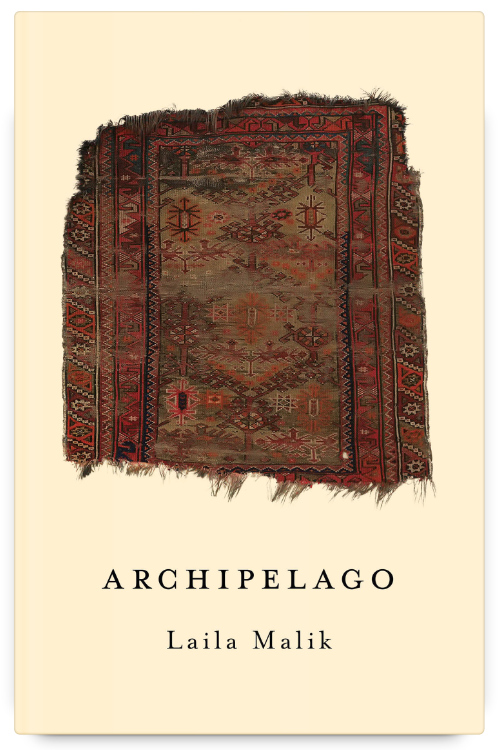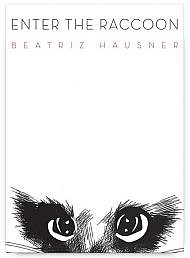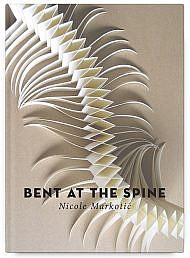The islands of an archipelago are isolated above sea level but attached underwater; connected yet separate. archipelago, the debut poetry collection from Laila Malik, traces fragments of family, becoming and unbecoming against the shifting shorelines of loss, multigenerational migration, and (un)belonging.
Malik’s lyrical poems intertwine histories of exile and ecological devastation. Beginning with a coming of age in the 80s and 90s between Canada, the Arabian Gulf, East Africa and Kashmir, they subvert conventions of lineage, instead drawing on the truths of inter-ethnic histories amidst sparse landscapes of deserts, oceans, and mountains. They question why the only certainties of “home” are urgency and impossibility.
At its core, archipelago is a letter to the daughters who come before and after, a quiet disclosure of barbed ancestral legacies that only come into focus through poetry.
Praise for archipelago
“This is a carefully chosen title—what is an archipelago, if not the geographical expression of multiplicity? archipelago by Laila Malik is the poetic expression of the geographic, then—a host of voices, overlapping, harmonious, discordant, dark, and humorous in turns. Grief can make an island of anyone: these poems can bring you to new shores.” —Nasser Hussain, author of SKY WRI TEI NGS
“There is so much movement in archipelago, but the meditations on home vis-a-vis the Gulf are most exciting for their rarity—this may be the first full-length poetry collection in English to take the Gulf itself as its subject matter. The impulse to erase the place you are in because it is erasing you is too strong. Yet though they dwell on the discomfort, vulnerability, and potential violence of not-belonging, these poems feel equally at home everywhere, moving very naturally and horizontally between parts of Canada, the Arabian Gulf, East Africa, and South Asia, reminding us that migration and movement are written into the very histories of these regions.” —Noor Naga, Scotiabank Giller Prize shortlisted–author of If an Egyptian Cannot Speak English
“In Laila Malik’s archipelago, we face the future like we face the sea or the desert: any great expanse we try to love, cross, or become. Malik’s vocabulary is a bridge—littered with secrets, inside jokes, careful references—that carries us over various landscapes, oceans, the wreckages of capitalism, colonialism, and climate collapse. A play on words is a play on politics because ‘history is a weapon of mass destruction.’ Encyclopedic in its cataloguing of our failures, spellbinding in its refusal to give up or into hope, this debut collection is a map of our devastations and desperation in equal parts. From the first poem ‘all your grandmothers have stopped cooking’ to the epilogue ‘irreconciliation,’ Malik deftly engages with the contemporary imaginary to unravel ‘treacherously translucent memory’ in the ‘nation of unanswerable questions.’ ‘Forever incanting’ across tense, like waves, this collection defies the sweeping tide of tragedy to attend to the molecular, the grains of rice, life, sand, and story alike. Evolutionary and environmental, reverent and reverberating, with rhythm and with rhyme, Malik’s words bounce across the page and back into our ears and mouths. From ‘oceans of indifference’ to ‘coastlines [which] eat their feelings,’ archipelago stretches across the dirt-sure truth that ‘embracing sand / becoming prayer’ is the key to turning ‘all this breaking / into something beautiful.’” —Sanna Wani, Trillium Book Award for Poetry–winning author of My Grief, the Sun
2024 Pat Lowther Memorial Award Jury Citation
“Laila Malik’s archipelago excavates the intricacies of diaspora experience. This is a poetics that sings of generational voices that come before and that will follow the poet’s lineage. Malik’s use of words and diction is fresh and surprising, and makes the diaspora grief hit all the more.”
2024 Gerald Lampert Memorial Award Jury Citation
“In archipelago, Laila Malik’s ideas tumble into each other. There are unusual compounds, which wed words together, phrases that suddenly stop mid-thought, or that seem to race on to another. There’s a balance between density and ease here that is enviable. Malik has such charm and variety in the visual field as well. Some poems are thin and reedy. Some have long lines arrowing across the page. Capturing some of the feeling of being between places and cultures, she makes stanzas into islands on the page, which, of course, benefits the title of the collection. All these devices build towards a sweet intimacy of what it means to be this narrator, navigating the complexity of having lived many lives already.”
Press Coverage
46 Canadian poetry collections to watch for in spring 2023 —CBC Books
Most Anticipated: Our Spring 2023 Poetry Preview —49th Shelf
In archipelago “home is constantly in a state of flux. It exists in a difficult relationship to physical place; the disconnect between generations makes it equally difficult for home to exist in metaphorical spaces.” —Manahil Bandukwala, Quill & Quire
What Sparks Poetry: Ecopoetry Now —Poetry Daily
Read an excerpt from archipelago by Laila Malik —Poetry Daily
“Malik’s poems carry the weight of unearthed treasures, ancient fragments of wisdom that researchers might devote their careers to piecing together. It is the deft juxtaposition between the ‘you’ and the ‘I’ and Malik’s culturally specific language that makes some poems, like ‘crooked elbows,’ so enthralling.” —Zoe Binder, ZYZZYVA
“In her evocative debut collection, Laila Malik draws on memory, not only personal recollection but ancestral and cultural heritage.” —Barb Carey, Toronto Star
“[Malik] writes of war and erasure, of exile and endurance, of the oil wars and ecological destruction, and of the accumulative losses both human and cultural, as well as of the imagination. One might call this a book of uprootedness, seemingly held above ground while still tethered, somehow, to a crumbling of broken soil” —rob mclennan, periodicities
Asian Heritage Month: Poetry Spotlight —All Lit Up
“In her debut collection, archipelago, Laila Malik considers un-belonging as a way of being.” —melanie brannagan frederiksen, Winnipeg Free Press
“Malik’s writing startles and delights word by word. She is playful with multiple languages, cultures and settings, and has created a collection of separate but interconnected pieces which ruminate on the stories/homeland(s) we carry, bury and create.” —Salma Hussain, The Temz Review
12 or 20 (second series) questions with Laila Malik —rob mclennan’s blog
Read This, Then That: Debut Poetry —All Lit Up
New Canadian Writers: Laila Malik —Jamie Gillingham, The Cardiff Review
The Best Canadian Poery of 2023 —CBC
Best List of 2023 Canadian Poetry Books —Dusie
Manahil Bandukwala: 2024 VERSeFest interviews: Laila Malik —periodicities
LAILA MALIK is a desisporic settler and writer living in Adobigok, traditional land of Indigenous communities that include the Anishinaabe, Seneca, Mohawk Haudenosaunee, and Wendat. Her work has been widely published in literary magazines and journals, including Contemporary Verse 2, Canthius, The New Quarterly, Ricepaper, Qwerty, Room, Sukoon, The Bangalore Review, and Archetype. Malik’s essays have been longlisted for four different creative nonfiction contests and she was a fellow at the Banff Centre for Creative Arts in 2021 for her novel in progress. archipelago is her debut poetry collection.






